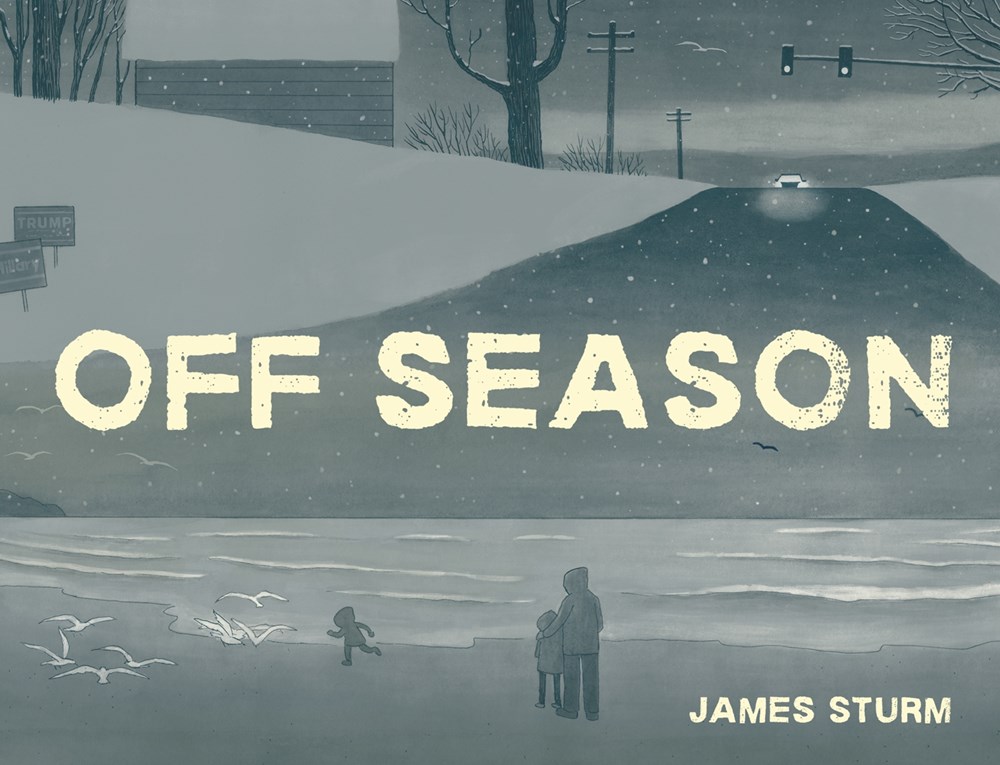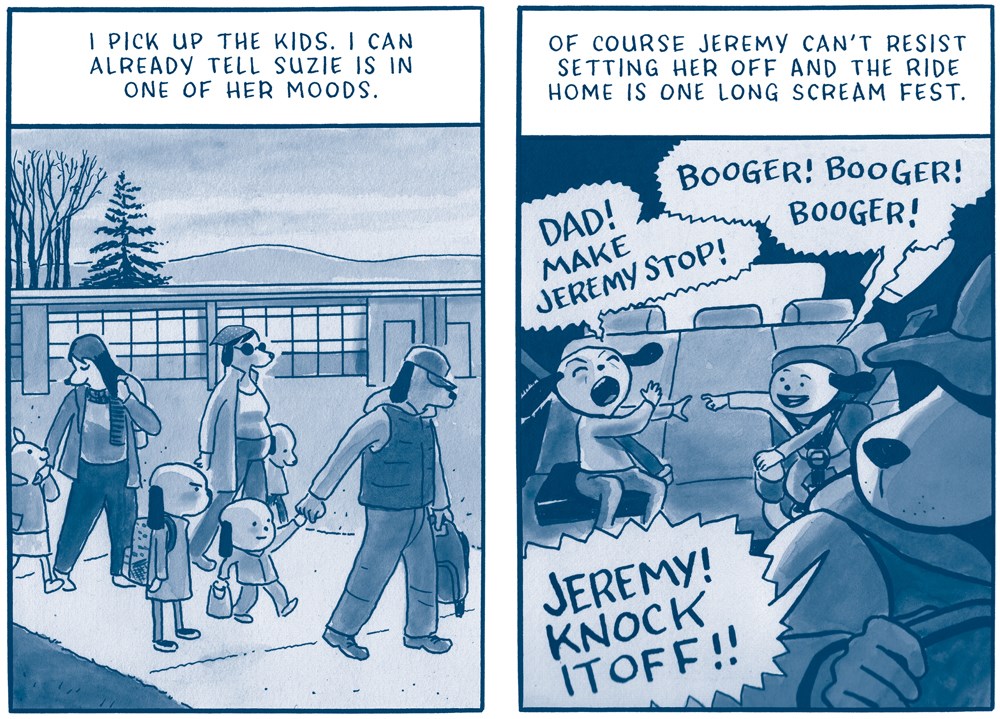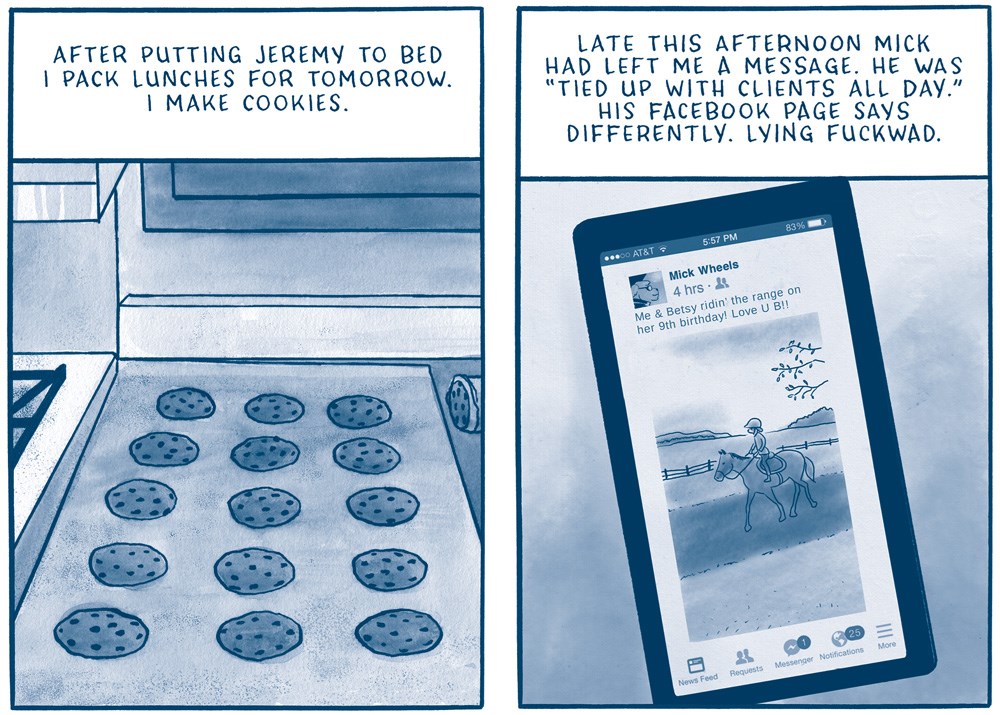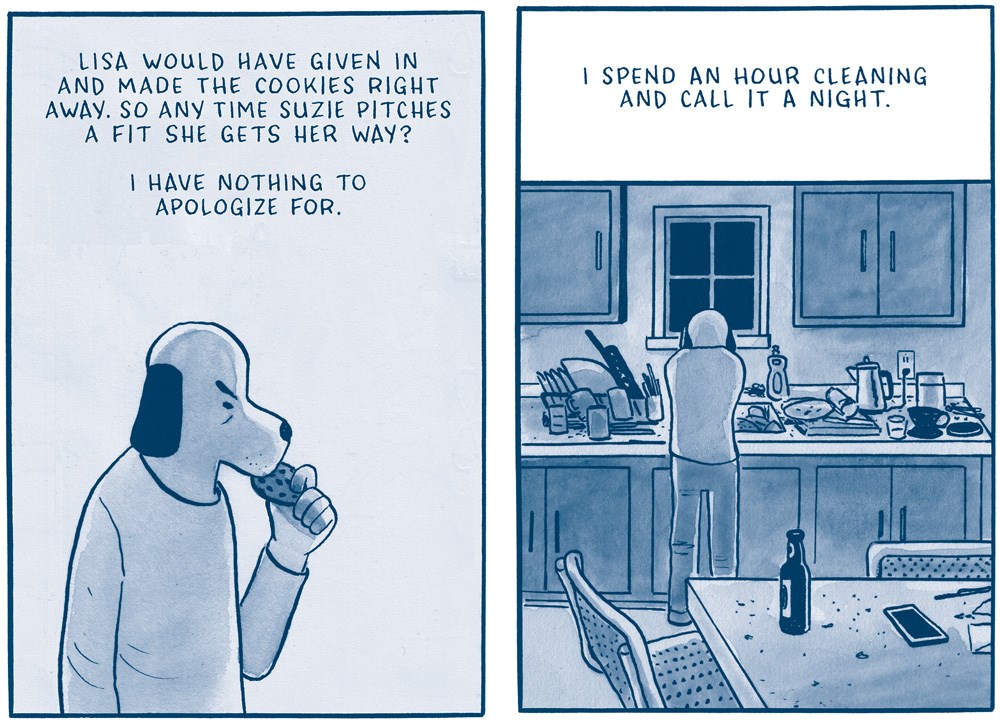
James Sturm has had an interesting couple of years as a cartoonist. His latest book, Off Season, was serialized on Slate, starting in September of 2016 and running through the presidential election and its aftermath. While the final compiled version, out this year from D&Q, is cleaned up and expanded, it is a fascinating examination of a time that continues to be an open wound.
Off Season is about Mark, a working class handyman and home builder who has recently separated from his wife Lisa. Lisa’s embroiled in the 2016 election as a volunteer for Hilary Clinton. Mark is subcontracting for a shady guy who won’t pay him and keeps delaying the work for a major client. The story of Off Season is one of upheaval; Mark deals with shifts in the reality politic, his relationship with his estranged wife, the health of his elderly parents, and his work. The main character’s profession seems a little odd, but it’s biographical, in a side-long kind of way: as Sturm was beginning the process of writing Off Season, he was getting bilked by a contractor doing work on his own home.
Off Season also acts as an artifact of an artists creating something in a specific time and place. Off Season was serializing on Slate at the same time that the 2016 election was happening. In effect, the second half of the book was created in response to the political crisis that election represented. Sturm uses Off Season as a way to process both his feelings about his business relationship with a contractor and the shock and horror of the post-election aftermath, the feeling that things had enormously and irreparably gone off the rails.
Sturm uses a simple 1×2 grid on each page, constructed so that Mark’s monologue runs in tandem with the events appearing on page. Much of the time, this is used to give Mark’s perception of the events that are happening in real time. These monologues reveal Mark’s mental state and his anger, which flares throughout the book. Sturm makes the odd choice to make all of his characters anthropomorphic dogs. Initially I was of the opinion that the book would have been better with human faces; on first read, it doesn’t seem like the anthropomorphism is necessary. However, on subsequent readings, I found that the dog faces add a level of opacity to the characters, and in general puts distance between them and the reader. The effect is an essential part of the work, and part of the reason that Off Season manages to stay afloat throughout a turbulent second act.
If you could use a word to explain the overall tone of Off Season, melancholic would be where I would start. The melancholy of the writing and the nostalgia is complemented by Sturm’s use of ink washes throughout the book. Sturm is an accomplished cartoonist, and just like his previous work, I found the pages of Off Season pleasantly illustrated and well composed.
As time wears on and I get a little more perspective about James Sturm’s work, I’ve realized that Sturm isn’t necessarily interested in his characters, but rather in the themes his work examines. Market Day, for instance, was about a Jewish rugmaker, yes, but it was actually a rumination on depression and anxiety as an artist. The story of Market Day is composed to extract the most value as possible from the thematic elements of the comic, not necessarily to be a satisfying or interesting narrative. You can say the same about his latest book. Off Season is about Mark and Lisa, their kids, the political realities of 2016, and all of that. But more importantly, it’s about betrayal.
Betrayal is everywhere in Off Season, and it’s not hard to see it if given the appropriate lens. At the core of the book is Mark’s relationship with his wife Lisa. He feels betrayed by her leaving him. His brother has moved away from home, leaving Mark to handle his elderly parents’ affairs. Mark’s boss, Mick, writes him bad checks and leaves him hanging out to dry. If you read it all one way, it seems like it’s Mark vs. The World. But the truth is more complicated – Mark is just as implicated as Lisa in the floundering of his marriage. He makes promises to his boss that he doesn’t keep. Betrayal rears its head with Mark’s petty behavior towards the people he loves, including his parents. He damages a client’s property when he doesn’t get paid. Mark does his fair share of betraying, and he’s not a saint or a good person, even – reading him as a benevolent every man whose had his world dumped onto him is a grievous error. The political undercurrent is also relevant; Mark was a big Bernie Sanders supporter, and feels betrayed that the Democrats have selected Clinton as their nominee. And, although the book never fully says so, there’s the unspoken yet probable reality that Mark voted for Donald Trump as a way to get back at his wife. Even the reader is betrayed by Mark and his unreliable narration.
The theme of betrayal is so profoundly presented in every moment of Off Season that it starts to grate on you. It feels as though Sturm, in his effort to say, “It’s a book about this thing! Do you get it yet?” overcooks Off Season. The final scene, presented as a monologue about Lisa’s cheating and her postpartum depression while a cat hacks up a hairball, is the most clear and overwrought example of this tendency. And because of this, I find myself irritated, almost insulted. Sturm fails to deliver a profound reading experience in Off Season because he doesn’t trust his reader, doesn’t have faith that they have a brain rattling around in their head. And while I remain impressed by Sturm’s illustrative choices, the thematic impact of the work, and how it clearly responds to a specific political moment, none of this redeems Off Season. It is an intelligent and fascinating book. But Off Season is also fatally flawed.
Sequential State is made possible in part by user subscriptions; you subscribe to the site on Patreon for as little as a dollar a month, and in return, you get additional content; it’s that simple. Your support helps pay cartoonists for illustration work, and helps keep Sequential State independent and ad-free. And if you’re not into monthly subscriptions, you can also now donate to the site on Ko-Fi.com. Thanks!



